Anne Fernald, Ph.D., professor of English and special adviser to the provost for faculty development, said one of her hopes for the retreat was to provide participants with inspiration and time to reflect on lessons of equity and inclusion gleaned during the pandemic and how technology and pedagogy can be used to advance those goals.
“Much of what we learned about racial justice and teaching online in the past two years was learned in crisis,” she said. “This retreat was designed to give us the chance to deepen those lessons while getting to know colleagues—both other teachers and some of the many support staff here at Fordham.”
Professors gathered in the mornings to workshop key concepts into their syllabi, including racial justice and anti-racism work. For example, Grace Shen, Ph.D., associate professor of history, led a worksop on “decolonizing the syllabus.” She discussed a class that was developed with funds from a Teaching Race Across the Curriculum grant, which supports ways that professors can integrate questions of race into their curricula. Shen, an expert in late imperial and modern China, showed how she incorporated those questions into her syllabus for the class.
“This way, everyone in the room heard from one colleague in a lot of detail of how she did it, so they can go back to their department and say ‘I have notes on how history did it, and here’s where I think history’s experience matters to our discipline,” said Fernald.
As the conversations evolved, so too did a shared understanding of what anti-racist teaching is and could evolve to be. The session was very hands-on, she said, with professors teasing out a common language for anti-racist teaching.
“In many cases, this is where the discussion starts,” Fernald said of the morning sessions.
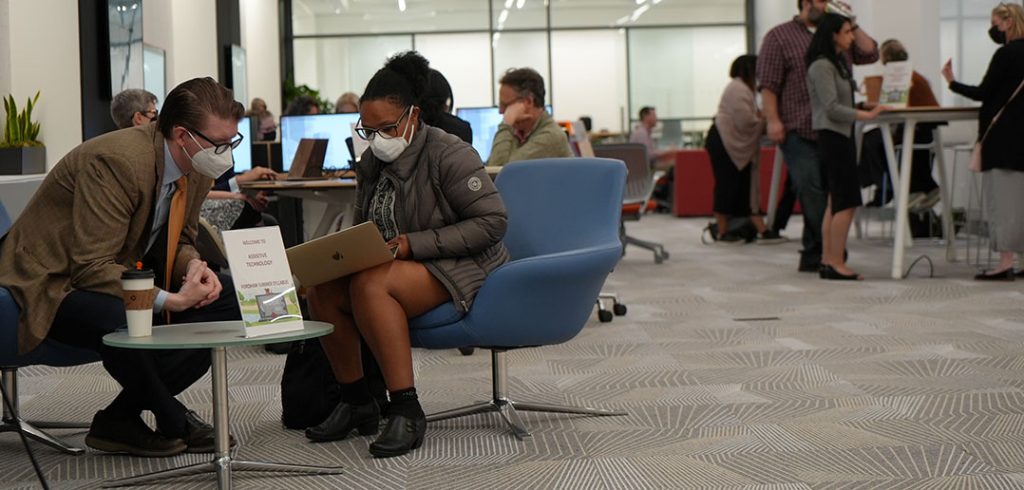
Steve D’Agustino, Ph.D., director of online learning, teamed with Fernald during the pandemic to reconceptualize teaching when everyone in the community was separated. Those lessons and benefits from online instruction have now carried over to in-person teaching. For example, he noted that the pandemic showed that students with disabilities who might not be able to attend class in person could fully participate online.
“There are people who are initially drawn to online learning as a form of assistive technology,” said D’Agustino,
A truly inclusive classroom would ensure that their unique perspective would contribute to the course, as well as provide much-needed access to learning, he said.
“During the pandemic, we all learned so much about teaching in mediated ways, teaching at a distance, perhaps even flipping my classroom,” he said, going on to explain the flipped classroom concept:
“In a traditional classroom, students do classwork in class and homework at home. In a flipped classroom, I may create learning activities for the students that they interact with at home, like a recorded lecture, and then in class they solve problems together.”
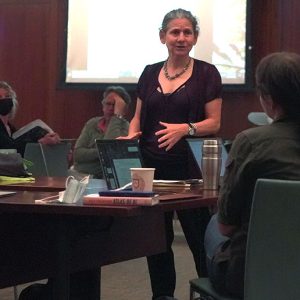
Groupwork and Beyond
During the four-day retreat, Fordham specialists held workshops that examined group dynamics. Sarah Gambito, professor of creative writing, held a workshop on creating community, and Jane Bolgatz, Ph.D., associate dean for academic affairs, looked specifically at the design and dynamics of group work.
Bolgatz discouraged starting large group work right away. She noted that most students come into the classroom competitive, so before starting out with larger groups, she advised keeping it simple by setting students up in pairs, then threes, and later fours.
“They got themselves into Fordham for goodness sake. They’re used to being competitive, so you’re going to have to cultivate their cooperative muscles,” she said.
For that reason, Bolgatz also expressed concern about the debate format, where students argue a particular point of view, rather than working together to understand why a particular group holds a particular view. She cited an earlier refection by Christie-Belle Garcia, Ph.D., former assistant dean for student support and success, which discouraged pitting students against each other via competitive situations.
“If we are caring for our students and we are putting them in a win-lose situation instead of a win-win situation, then we’re going to have people losing,” she recalls Garcia saying. “And sometimes that’s fine. That’s true in life. But I just would temper that with our cooperative time, where we’re all going to be better at this task because we’re all getting better together,” she said.
Bolgatz also talked about aspects of exclusivity inherent in debate that professors need to be cognizant of.
“Think about what a debate may be for a learner for whom English is not their first language. They’re just as smart as everybody else, but they just can’t think about the answer as fast if they’re still understanding the question,” she said.
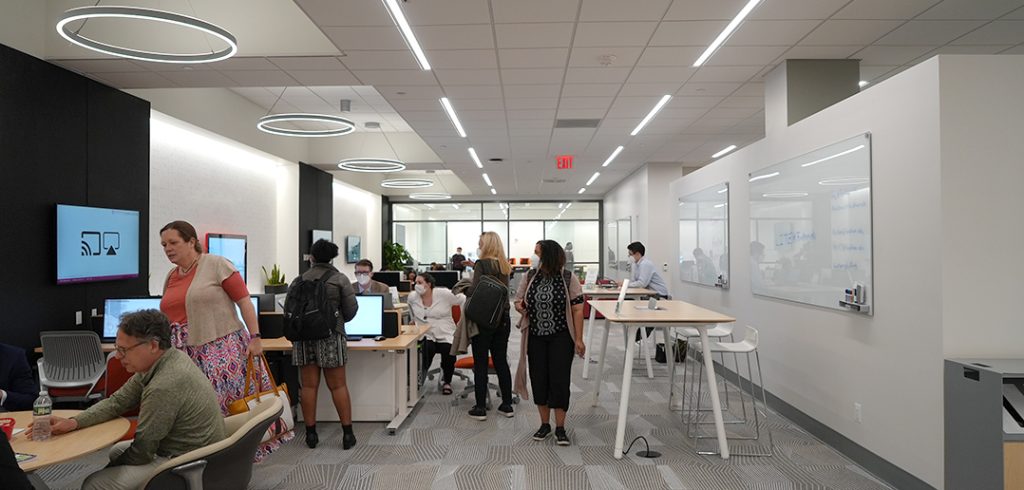
Questioning for the Advanced Learners
Jon Craven, Ph.D., associate professor of education, said he develops a syllabus by asking students what they want to learn and what questions they want to be answered. It’s a method he reserves for graduate students.
“We know how adults learn and if they don’t have a stake in the purpose for learning, they will go through the hoops of completing the components of the syllabus without learning much,” he said. “The construct you hold in your head on what teaching is—and who you are teaching— impacts what you do in the classroom.”
Learning Commons at LITE
Each day of the retreat closed with the professors convening in the Walsh Family Library’s new LITE Center. For that week, the modular spaces at LITE, which stands for Learning & Innovative Technology Environment, acted as a one-stop-shop for the duration of the retreat and provided professors with resources to work on their new syllabi, including consultants from IT, the Center for Community Engaged Learning, Blackboard, Educational Technology and Digital Scholarship, Fordham Libraries, and Student Support.
“I can come here and talk to someone from IT, get access to a 3D scanner, or make a podcast. Here, I can sit with an expert. And the leadership here seem very committed to making this as much a one-stop-shop for faculty as possible,” said D’Agustino. “The truth is we’re in a process of hybridization; no one is just in the digital space anymore, and no one is just in the physical space.”
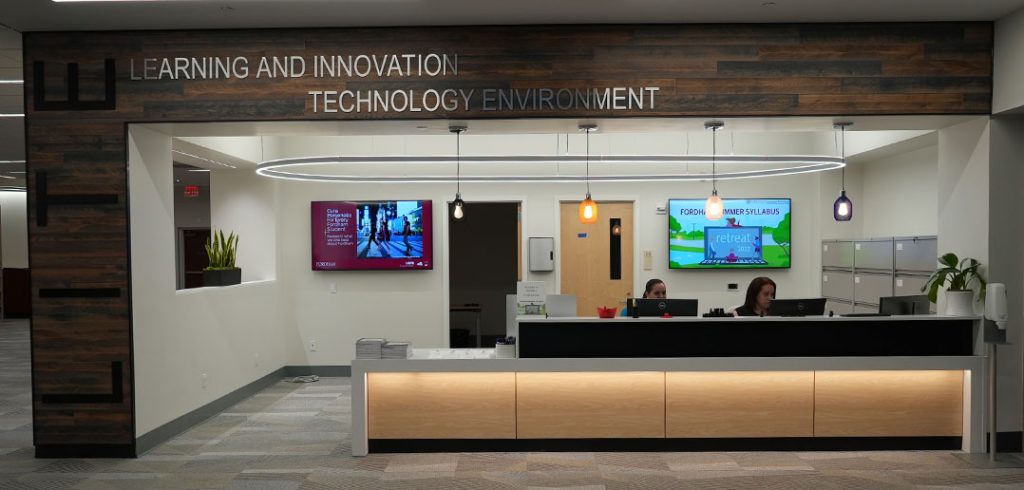
]]>
“My dream is to help ground justice movements through spirituality,” said Arellano, an online student in GRE’s master’s program in Christian spirituality and the daughter of immigrant blue-collar workers. “When organizers aren’t spiritually grounded, it can easily lead to burnout. The more that we can center [spirituality]… the more that people can see their work as an extension of their love for God, the Earth, and people.”
Reimagining the Catholic Church
Arellano is a first-generation Mexican American from Little Village or “La Villita,” a Mexican neighborhood in Chicago. Her mother, a former public school cafeteria worker, often took Arellano and her three sisters to labor union protests and marches, where Arellano learned how to advocate for social justice.
“My mom modeled what it means to fight oppression with your community. That planted so many seeds about how I see the world,” Arellano said in a Zoom call from her home in Chicago, where she attends her Fordham classes remotely.
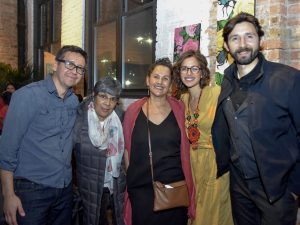
Over the next decade, Arellano combined her Catholic spirituality with her passion for workers’ rights at several organizations, where she coordinated communication efforts and managed funding. Among them was the Archdiocese of Chicago.
“Seeing both the light and the shadow of the church helped me form connections with like-minded people. We reimagined a church where we center the voices and experiences of Catholic people of color, launch campaigns to improve neighborhoods, hold people in power accountable, and talk openly about the systems of oppression that affect us,” Arellano said.
She was inspired to co-found the Coalition for Spiritual and Public Leadership, a nonprofit that teaches faith leaders how to engage in local social justice campaigns related to gender, class, racism, and the environment through the lens of Catholic spiritual and theological traditions.
While developing CSPL’s curriculum, Arellano considered what she learned from Fordham.

“In our CSPL training programs and workshops, we use a lot of Ignatian spirituality and contemplative imagination, including works that I’ve read about in class,” said Arellano. “I’m also going to lead a program that looks at mystical texts and see how we can apply and ground them through a racial, gender, and class analysis. I attribute and credit all of that to Fordham.”
Her Fordham studies have also helped her with her full-time job as a press strategist for the National Domestic Workers Alliance, where she assists affiliates with their strategic communication and teaches domestic workers how to share their stories with the media. Arellano said it was a Fordham pastoral counseling course that strengthened her skills in deeply listening to the domestic workers that the alliance serves.
“When they share their stories and vulnerable moments, you really need to discern how you move that conversation along and also help people who feel like they’re stuck in a repetitive trauma story cycle. The skills that I learned [from Fordham]helped me deepen how intentionally I listen during my spokesperson prep sessions with leaders,” Arellano said. “My mom was one of the spokespeople for her union, and I knew how transformative it was for her to share her experience in the media, especially when it’s tied to a call to action and to demand change. I’ve seen the transformation of working with domestic workers who felt really shy about sharing their story, but then through building trust and working with them, I’ve heard members say, ‘You can put me in front of 10,000 people, and I still want to share my story.’”
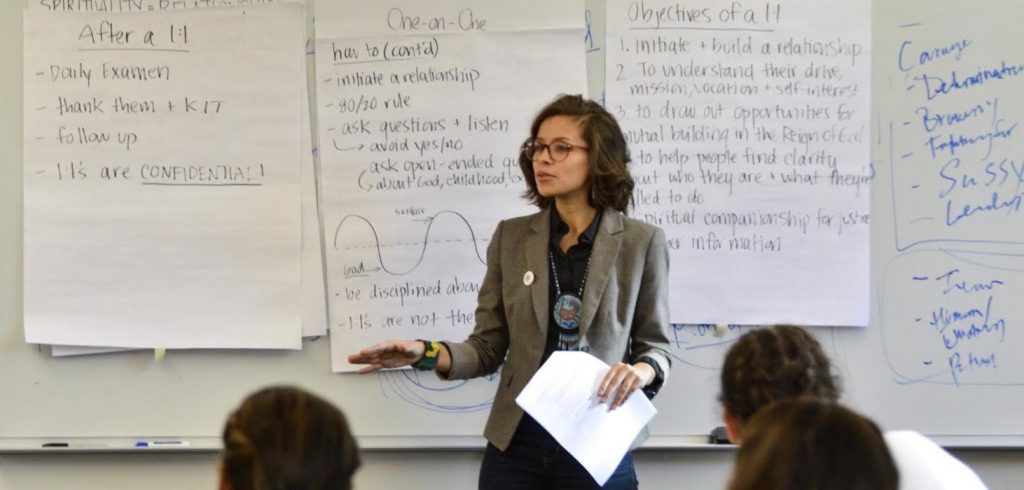
Dear Catholic Women of Color
Arellano enrolled in GRE in 2018 to strengthen her spiritual life and identity as a Catholic woman. Her thesis paper will examine how Mexican-American Catholic women can fuel their faith by drawing from indigenous practices.
“I come from a Mexican family and a line of women who worked closely with herbs and had a great reverence for the Earth and the elements, and I want to honor the indigenous lineage that I carry. But we’re also Catholic,” Arellano said. “My thesis will focus on how we can deepen our relationship with our [faith]and our ascended ancestors while thinking about the gifts that Mother Earth offers us through plants and the elements.”
Arellano, who is aiming to graduate in February 2022, says she’s grateful for her time at Fordham.
“I never imagined I would be in a theology program that is so prestigious, warm, and welcoming, where it’s constantly challenged me to be better … where I feel like the dean is actively recruiting more women of color to be theologians, more professors who are people of color,” Arellano said. “I wish I had a megaphone and could say to any other Catholic woman of color, ‘If your heart desires theological training and formation, your first thought should be Fordham.’”
]]>They’ll find some helpful advice in the new Twice Over podcast.
The brainchild of hosts Anne E. Fernald, professor of English and women’s, gender, and sexuality studies and special advisor to the provost for faculty development, and Steven M. D’Agustino, director of online learning, Twice Over is a spinoff of the town hall meetings Fernald and D’Agustino have both recently hosted to assist faculty members with the transition to distance learning.
Titled Twice Over “because to teach is to learn twice over,” the podcast hopes to provide “asynchronous advice” to faculty, with compelling conversation between the hosts and potential guests, questions from listeners, and interviews with people in the Fordham community.
Their inaugural episode, It’s Okay to Look like a Potato on Zoom, debuted on March 25 on SoundCloud. It includes discussion about “how to stay connected to our love of teaching as we struggle to redefine our classes and rethink our practices.” Check their SoundCloud page for new episodes. The podcast can also be found on Stitcher and Spotify.
Follow the hosts on Twitter @twiceover1, and email them at [email protected].